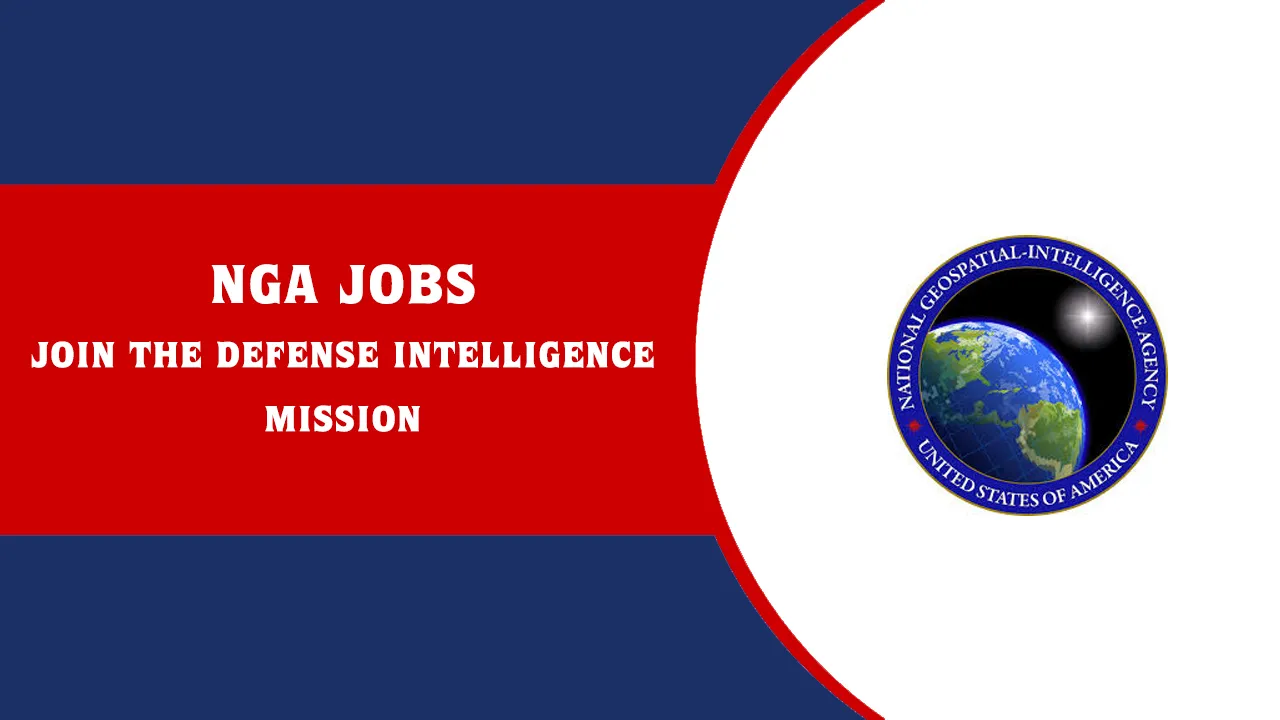Job seekers who are excited about how data, maps, and intelligence come together to guide powerful decisions should take the next step by applying to NGA Jobs. In today’s fast-paced and unpredictably changing world, government jobs have taken on a new level of importance for professionals seeking financial stability and a sense of purpose. While private sector careers often shift with market trends, roles within federal agencies offer long-term career paths and the chance to contribute to something far more significant than oneself. Those who are interested in national defense, technology, and making a meaningful impact on the country’s safety are ideal candidates for the NGA.
As one of the most specialized and mission-oriented organizations in the U.S. intelligence community, the National Geospatial Intelligence Agency plays an important role in national security. From supporting combat troops in the field to aiding disaster relief efforts across the globe, the agency turns raw satellite imagery and data into usable intelligence. Its work supports military operations, homeland security strategies, emergency management planning, and even humanitarian responses. This level of involvement places the agency at the center of tech, defense, and diplomacy. As a result, this makes it an ideal workplace for individuals who want their work to matter on a global scale. So, be sure to submit your application now!
For More Latest Private Jobs: Click Here
| Company Name: | NGA |
| Job Locations: | United States |
| Last Updated on: | August 15th, 2025 |
NGA Jobs 2025 | Newest National Geospatial-Intelligence Agency Jobs

About the National Geospatial Intelligence Agency (NGA)
The National Geospatial Intelligence Agency serves as the main source of geospatial intelligence for the United States. This means the organization is responsible for collecting, analyzing, and distributing intelligence that involves maps, imagery, and other geospatial data. While this might sound specialized at first, geospatial information is key to nearly every area of national security. This includes locating enemy targets and coordinating disaster relief efforts in the aftermath of a hurricane.
The agency’s work informs both high-level strategic decisions and immediate tactical operations. It provides a level of support that few other federal agencies can match. Founded under the Department of Defense and closely associated with the larger Intelligence Community, the agency operates with a clear mission. It is to deliver timely, relevant, and accurate geospatial intelligence in support of homeland security. Aiming to be the world leader in geospatial data, it constantly responds to emerging threats and technologies.
Why Work at NGA?
The National Geospatial Intelligence Agency is far more than a government institution. It’s a community built around shared values, a purpose, and creative thinking. This agency’s employees aren’t just clocking in to work, they perform roles that are important to national security, humanitarian aid, and global awareness. The culture of this organization encourages collaboration, analytical thinking, and a forward-looking approach to every mission. From the moment individuals join, they become part of a well-coordinated team that values both individual talent and collective success.
One of the defining features of the agency’s culture is its focus on service. Here, every decision, project, and data point contributes to safeguarding the nation and its allies. Introducing new ideas is equally important. Employees are constantly encouraged to explore different perspectives, test new technologies, and rethink conventional intelligence methods. That’s why professionals here often describe their work as intellectually challenging and professionally rewarding. And with operations touching on areas like AI, cyber-defense, and immediate analysis, there’s always something new to master. Additionally, there are some other reasons why this agency is a preferred employer.
- Advanced Tools and Tech Access: Employees work with the latest platforms, including 24/7 satellite data systems, machine learning models, and virtual environments that compete with the best in the private sector.
- Global Mission Reach: The work supports operations not just in the U.S., but across international partner locations, giving employees a truly global perspective.
- Diversity of Backgrounds and Roles: From historians to computer scientists, the workforce includes professionals from virtually every field, creating an interdisciplinary environment that encourages fresh thinking.
- Professional Development: The organization offers clearly defined paths for promotion and specialization, making long-term planning more accessible and achievable.
- Employee Resource Groups (ERGs): Inclusion-focused groups support a range of identities and communities, providing mentorship and cultural connections within the workforce.
- Community Engagement: Employees frequently participate in outreach programs, educational initiatives, and STEM partnerships that strengthen local ties and future talent pipelines.
Work Locations and Facilities
While many assume intelligence works are confined to Washington D.C., the National Geospatial-Intelligence Agency has built an expansive operational network across the country and the world. Its main headquarters are strategically located to support various mission types and ensure effective coordination with military and governmental partners. These facilities are purpose-built to support classified work and timely decision-making, while also offering comfortable, modern environments for employees.
Springfield, Virginia – NGA Campus East
This is the agency’s flagship location and serves as the central hub for the agency’s top intelligence operations. NGA Campus East houses the highest concentration of analysts, executives, and leadership staff. It’s close to the Pentagon and Washington D.C., which makes it ideal for interagency collaboration. The facility features high-security infrastructure, specialized technology labs, secure meeting rooms, and employee amenities such as on-site fitness centers and cafeterias.
St. Louis, Missouri – NGA Campus West
NGA Campus West is steadily establishing itself as a center for research and geospatial research. The site is undergoing expansion with the construction of the Next NGA West (N2W) facility, which is expected to become fully operational in the near future. This campus focuses heavily on data science, engineering, and tech development and has become a magnet for new graduates and early-career professionals hoping to work with intelligence and new technologies.
Nationwide and Global Presence
Beyond its two main campuses, the agency operates in over 100 locations across the United States. It has a presence in 20+ countries around the world. These sites are important for field intelligence, military mission support, and international collaboration. While many of these roles require relocation or travel, they also offer employees an opportunity to work on the front lines of global intelligence operations.
Types of Careers at NGA
There are a variety of NGA jobs, each specializing in a specific mission. It consists of disciplines ranging from extensive analytical research to advanced technology development. Every role at this agency provides service to national interests, and all are necessary to its success. Listed below are some common openings.
Civilian Careers
Among the civil servants who support daily operations are data analysts and systems engineers, as well as public policymakers and cybersecurity professionals. Analysts play an important role in turning satellite images into actionable intelligence, while engineers design the digital infrastructure that enables reliable data sharing. Cybersecurity experts ensure that confidential systems remain protected against unauthorized access, and policy advisors develop the guidelines that inform responsible intelligence use.
Military Support Roles
The agency’s partnership with the military is a defined feature of its operational strength. Military support roles are ideally positioned to fill the gap between field needs and agency capabilities. Service members contribute their tactical expertise and receive specialized training in geospatial tools and methodologies. These positions enhance coordination during joint missions and allow military professionals to increase their potential both during and after active duty. The organization values this experience and ensures that military members are equipped with both the resources and the recognition they deserve.
Student & Entry-Level Programs
For college students and fresh graduates, there are multiple ways to launch a career with the agency. These internship programs allow participants to work alongside experienced professionals while being exposed to intelligence projects that carry an actual impact. Co-ops and apprenticeships provide long-term development opportunities, with academic involvement and mentorship. Additionally, there are entry-level positions which make the jump from campus to full-time employment effortless. Many interns eventually return as full-time employees, establishing careers from the ground up at one of the most respected institutions in the federal service.
Executive & Senior Roles
The agency’s top leadership positions fall under the Defense Intelligence Senior Executive Service (DISES) and Defense Intelligence Senior Level (DISL) classifications. These positions are reserved for individuals with considerable experience in intelligence, defense strategy, or large-scale technical operations. Executives lead high-profile departments, influence agency direction, and represent the organization at interagency meetings. Candidates are usually required to possess postgraduate education, extensive managerial experience, and a track record of strategic impact. These roles come with significant responsibility, but also with an incredible opportunity to influence the future of national security intelligence.
Salary and Compensation
There is more to NGA jobs than recognition. These positions bring financial stability, steady growth, and access to one of the most attractive benefits packages in the federal service. The salary structure is based on the General Schedule (GS) pay scales, but some roles, especially those requiring high-level clearances or master’s degrees, may be compensated through alternative pay bands that allow greater flexibility. This ensures that exceptional talent is not only recruited but retained over the long term. Salaries are adjusted regularly to remain competitive with both government and private-sector standards.
In addition to regular pay, many positions include location-based salary adjustments, which reflect living expenses differences across operational sites like Springfield, Virginia and St. Louis, Missouri. Employees who deliver outstanding performance or take on challenging roles may also qualify for performance-based bonuses or recruitment incentives. Furthermore, the full range of employee benefits, from comprehensive healthcare insurance to generous paid leave and retirement savings plans, contribute to both personal and professional well-being. Here, workers can also take advantage of voluntary benefit programs like life insurance, dental and vision care, and flexible spending accounts. In this agency, salaries may look like these:
- Intelligence Analyst (GS-11 to GS-13): Depending on experience and education, analysts can expect to earn between $72,000 and $108,000 annually, not including bonus eligibility.
- Cybersecurity Specialist (GS-12 to GS-14): With the increasing growth of cyber threats, these roles often command salaries between $88,000 and $125,000 per year.
- Geospatial Engineer (GS-11 to GS-14): Engineers focusing on systems design or GIS tech earn between $80,000 and $130,000 depending on certification and clearance level.
- Internship Program (Stipend-based): While full-time salaries don’t apply, interns may receive stipends of $3,000–$5,000 for summer placements, with some programs offering tuition assistance.
- Senior Executive (DISES/DISL): Executive roles can range from $150,000 to over $190,000, especially in positions managing potentially dangerous units or overseeing high-clearance departments.
Eligibility Criteria
Applying for NGA jobs means joining the most secure and strategic organization in the country. Because of this, eligibility requirements are strict and designed to ensure the confidentiality of highly classified national intelligence operations. The first and most important requirement is U.S. citizenship. Every applicant, regardless of background or role, must be a U.S. citizen without exception. This standard reflects the agency’s key responsibility for national security and follows federal hiring laws for intelligence roles.
An important factor in selecting eligible candidates is education. While the required academic background depends on the position, most positions call for a bachelor’s degree or higher, notably in fields like engineering, computer science, international relations, and geospatial studies. Professional technical roles may require additional certifications or proven expertise in specialized tools and methodologies. However, academic achievement is only one side of the coin. Applicants must also have the right combination of skills and flexibility to succeed in an environment with high stakes and constant change. Other eligibility criteria include:
- Dual Citizenship Not Accepted: Applicants holding citizenship in another country, even if born in the U.S., are generally ineligible unless they renounce their foreign citizenship.
- Drug Use Policy: Recent illegal drug use, including marijuana (even if legal in a state), may disqualify candidates due to federal security standards.
- Credit History and Financial Responsibility: A stable financial background is often part of the clearance assessment. Excessive debt or past bankruptcies could delay or deny approval.
- Continuous Residency: Candidates who have spent significant time living abroad may face delays or added scrutiny during background checks.
- Language Proficiency Advantage: Applicants fluent in strategic foreign languages may receive priority consideration for intelligence and analysis roles.
- Physical and Medical Fitness: Some field or support positions may require applicants to meet physical health criteria, including vision and speed tests.
How to Apply for NGA Jobs?
To apply for NGA jobs, visit their website and click the “Apply Here” button. On their careers website, you can find open positions, most of which are directly listed. Additional listings may appear through federal portals like USAJobs or through Handshake, a career platform frequently used by university students and fresh graduates. Whether a candidate is an established intelligence professional or applying for an internship, it’s important to read each job posting carefully, as requirements and application instructions change across departments.
Once a position has been identified, submitting a carefully written resume is a necessity. Unlike private-sector resumes, federal resumes usually include details about exact dates of employment, duties, and clearances or certifications. Applicants should highlight experiences that show analytical thinking, attention to detail, and the ability to handle confidential information. After the initial application, successful candidates may be invited to interviews, written tests, or recruitment events. Information sessions are held both on-site and online to help applicants understand the agency’s culture, mission, and hiring process. From submission to onboarding, the timeline may range from two to six months, depending on clearance processing and the nature of the job.
Summary
Those seeking meaningful federal employment can find long-term growth, national impact, and new opportunities with NGA jobs. With a culture focused on service and a forward-thinking approach to geospatial intelligence, the agency empowers individuals to work on missions that influence both national security and humanitarian outcomes. Whether it’s the variety of roles, the newest tools, or the flexibility to work either on-site or remotely, this is an organization where desire meets purpose. So, if you’re ready to start a career that incorporates technology, leadership, and service, the process starts by exploring open roles and submitting an application through the agency’s official portal.
 Find Newest Jobs in USA
Find Newest Jobs in USA



